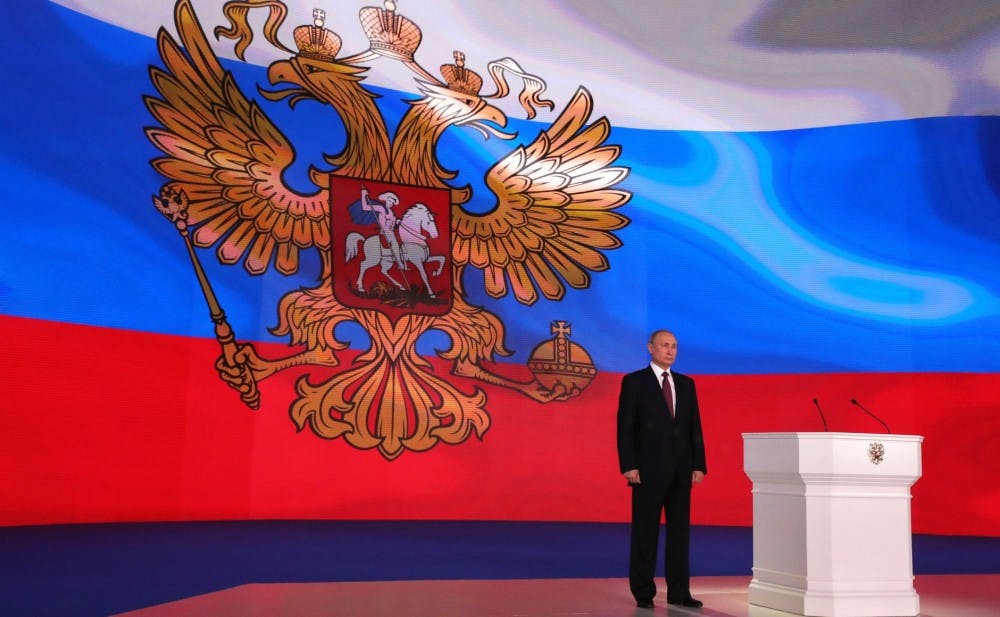Russia, as most politicians, analysts and even some at the White House will tell you, is a “bad actor” on the international stage. From continued involvement in the Ukraine, to the murder of political dissidents in the U.K. and meddling in the U.S. election, Russia has made it abundantly clear that it stands in opposition to the international community and has no interest in peace and stability.
More recently, the Trump administration has imposed new sanctions against the Russian Federation in response to its meddling in the 2016 election, but also for hacking parts of the U.S. energy grid. These sanctions, while welcome in the fight against Russian geopolitical aggression, do not go far enough and can be viewed simply as a supplemental addition to the previous sanctions imposed over Russia’s violation of Ukrainian sovereignty. Despite the massive impact that previous sanctions by the U.S. and the European Union have had on the Russian economy, Russia is slowly recovering from its recession and the economic forecast, while not overly optimistic, is still much better than when sanctions were introduced in 2014.
Overall, these new sanctions, just like the last round, will likely have little overall impact on Russia’s long-term ambitions of re-establishing its sphere of influence by destabilizing western powers. To really impact Russia, to curb its aggression, more targeted measures are needed; though, this might prove difficult as our current commander-in-chief appears to have little appetite for holding Russia’s feet to the flame. Sanctions, however, are not the only, or even the best, way to make Russia bleed. Perhaps there is a way for both Trump and the international community to win out against Russia.
With this in mind, we first need to take a look at the Russian economy, particularly its exports. As of 2016, exports make up some 25.7 percent of Russia’s GDP. For comparison, exports only account for 11.9 percent of the U.S.’s GDP. Hydrocarbon exports (oil, natural gas and coal) represent a significant part of this number, with 46.4 percent of all Russian exports falling into this category. The importance of this number cannot be overstated as the 2014 recession in Russia was caused, in large part, by falling oil prices. Furthermore, “over 50% of the federal revenues fall to the share of oil and gas revenues,” with much of this coming from the Russian companies Rosneft and state-owned Gazprom. Given all of this, if we want to hit Russia where it hurts, we need to go after their hydrocarbon exports and there’s no better way to do this than through the U.S. pushing Russia out of the European energy market.
This is not an easy task, however. Over 55 percent of all Russian exports go to Europe. European dependency on Russian hydrocarbon imports is significant, with Russia supplying 39.5 percent and 30.9 percent of EU natural gas and petroleum, respectfully. Increased U.S. involvement in the European energy market could be significant as it would not only shore up Europe’s energy security and protect it from Russian manipulation, it could devastate Russian profits to the benefit of the U.S. and U.S. companies. Similar plans have already been suggested and put into action, but greater emphasis is needed. The U.S. will be a “net energy exporter by 2022,” and we must capitalize on this advantage by making inroads into the European market now instead of later on.
While the president, who fashions himself a deal-maker, has made clear his disdain for trade deals, even those that benefit the U.S., trade deals on oil and natural gas sales into the EU from the U.S. could prove particularly beneficial to both. For the U.S., it would be a strategic advantage. While letting normal free market influences run their course may benefit the U.S. in the long run, pressure on Russia is needed now. A trade deal could facilitate this, giving both the EU and the U.S. leverage over the Russians. Essentially, the better the terms for the trade, the worse the outcome for Russia. By factoring this into the agreements, Russia could be forced to back off of some of its more egregious breaches of peace to maintain its influence within the European market and its recession recovery.
For the EU, such a deal could be beneficial by helping secure energy supplies from foreign disruption and manipulation. There are other benefits as well. U.S. oil, for example, is simply a better product than Russian oil, particularly as Russia has shifted to selling its best oil to China, rather than the EU. Another benefit, such a deal would help reassure EU-U.S. ties in an increasing fragile and fractured international system. Our president has done few favors in maintaining this extraordinarily vital partnership and this type of deal could go a long way in restoring relations with the world’s second largest economy (by GDP).
All in all, a U.S. push for preferential trade deals on oil and natural gas with the EU could only stand to benefit both. Both parties would receive economic benefits and new, palatable leverage over an increasingly belligerent Russia. Russia must pay, quite literally, for its role in destabilizing the world – unbridled aggression must have consequences.

